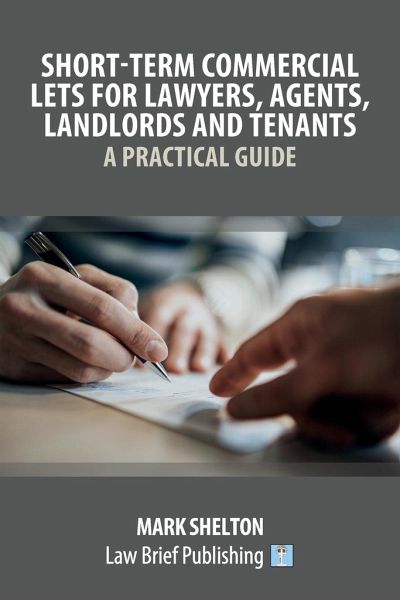
Short-Term Commercial Lets for Lawyers, Agents, Landlords and Tenants - A Practical Guide
Versandkostenfrei!
Versandfertig in 1-2 Wochen
70,99 €
inkl. MwSt.

PAYBACK Punkte
35 °P sammeln!
Average length of lease terms has been falling for years, and the days of the 25-year term as the dominant form of commercial lease are long gone. One of the challenges this presents is keeping transaction costs down. A landlord who lets for three-year terms over a 25-year period, instead of one 25-year lease, faces eight sets of letting costs instead of one. At the same time, landlords have conventionally wanted to avoid conferring security of tenure in relation to such short-term lettings. Those objectives have often been achieved by the use of short-form, standard licences to occupy, signed...
Average length of lease terms has been falling for years, and the days of the 25-year term as the dominant form of commercial lease are long gone. One of the challenges this presents is keeping transaction costs down. A landlord who lets for three-year terms over a 25-year period, instead of one 25-year lease, faces eight sets of letting costs instead of one. At the same time, landlords have conventionally wanted to avoid conferring security of tenure in relation to such short-term lettings. Those objectives have often been achieved by the use of short-form, standard licences to occupy, signed without any involvement of solicitors, though this practice is not without risk. The safest option is a short-term lease, contracted out of security of tenure, but many agents and landlords baulk at that, believing that it cannot be done without involving lawyers. Now, in the post-Covid-19 world, with pop-up, flexible lettings increasingly seen in many sectors, and standard forms of short-term lease available for free on the internet, it is easier than ever before for the lay person, with a little knowledge and common sense, to document a contracted-out lease for themselves. That does not mean there is no role for the solicitor. Selection of a standard form which will be acceptable, and developing protocols for the execution of leases and the conduct of the contracting-out process, are areas in which solicitors can add value. Certain processes are reserved by law for solicitors, and there are 'here be dragons' areas into which the lay person should not stray. This book will consider the available options, including the content of leading standard lease forms, and the parameters within which agents and landlords can document lettings with confidence. It will also assist the hard-pressed solicitor trying to deliver a suitable lease for an acceptable fee. ABOUT THE AUTHOR Mark practised in major commercial law firms for thirty years, specialising in property dispute resolution. He has acted for businesses large and small, including FTSE-listed property companies and household-name corporate occupiers, across the whole range of property-related issues. He is now a full-time commercial property management law trainer, putting his expertise and experience to good use in training both lawyers and surveyors. He delivers training both in-house and for providers including MBL Seminars, Professional Conferences, CPT Events and Solicitors Group. Mark is also the author of a number of books within his areas of expertise. CONTENTS Part 1 - An Introduction to the Content of Leases - For Landlords and Occupiers Chapter 1 - What Must I Pay? Chapter 2 - How Long Will the Lease Last For? Chapter 3 - For What Actions Must I Have Landlord's Consent? Chapter 4 - What Must I Do About the Physical State of the Property? Step-by-Step Guide For the Non-Lawyer Glossary of Useful Terms Part 2 - Documenting a Letting Chapter 5 - Uncertain Times and the Role of the Lease Code Chapter 6 - Use of Licences and Tenancies at Will Chapter 7 - Lease Formalities and the Three-Year Rule Chapter 8 - The Contracting-Out Process Chapter 9 - Three Standard Forms of Lease Chapter 10 - Other Resources




